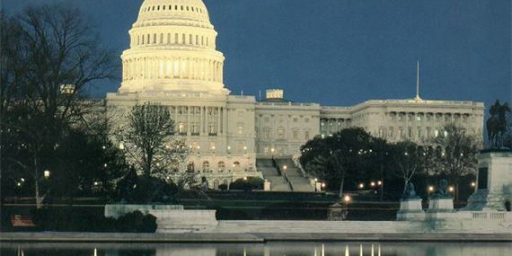War Powers Act and Illegal Wars
Is the war in Libya illegal?
Doug Mataconis’ post “Authorization For Libyan War Set To Expire Next Week, Don’t Expect Anyone To Do Anything About It” has generated some great discussion, both here and around the blogosphere.
Conor Friedersdorff believes Congress owes us a vote, while Matt Yglesias correctly guesses that Congress will continue its pattern of “show[ing] very little interest in constraining presidential warmaking power.” They’re both right.
Andrew Sullivan, though, is outraged, declaring, “The war in Libya becomes illegal from now on. And the imperial presidency grows even more powerful.”
While one can debate the degree to which the presidency is imperial, it’s simply untrue that the war in Libya is illegal in any shape, manner, or form. It’s being conducted under the auspices of both the UN Charter and the North Atlantic Treaty, which rather covers it internationally. And, as Doug explains well in his post, presidents have from the earliest days of the Republic exercised the power to send forces into harm’s way.
It’s been said that the Constitution is an invitation to struggle, especially with respect to foreign policy. That’s especially true with respect to the war power, which was ambiguously divided by the Framers. Congress has the sole authority to declare war, raise an army and a navy, fund military training and operations, and confirm senior officers and officials. But the president is the commander-in-chief of our armed forces, with wide discretion in their use.
The War Powers Act seeks to clarify the roles, in Congress’ favor. Although, ironically, it does so by initially conceding that the president has a right to send forces into combat without permission–it just imposes a time limit.
The problem is that, not only is the War Powers Act likely unconstitutional in several ways (see Doug’s post and this section of the Wikipedia entry for a brief overview) but it actually doesn’t force the president to do much of anything. While part of the US Code (Title 50, Chapter 33) it’s simply a joint resolution of Congress.
Presumably, Andrew’s interpretation is illegality comes from § 1544 and specifically subsection (b):
(b) Termination of use of United States Armed Forces; exceptions; extension period
Within sixty calendar days after a report is submitted or is required to be submitted pursuant to section 1543 (a)(1) of this title, whichever is earlier, the President shall terminate any use of United States Armed Forces with respect to which such report was submitted (or required to be submitted), unless the Congress
(1) has declared war or has enacted a specific authorization for such use of United States Armed Forces,(3) is physically unable to meet as a result of an armed attack upon the United States. Such sixty-day period shall be extended for not more than an additional thirty days if the President determines and certifies to the Congress in writing that unavoidable military necessity respecting the safety of United States Armed Forces requires the continued use of such armed forces in the course of bringing about a prompt removal of such forces.
(c) Concurrent resolution for removal by President of United States Armed Forces
Notwithstanding subsection (b) of this section, at any time that United States Armed Forces are engaged in hostilities outside the territory of the United States, its possessions and territories without a declaration of war or specific statutory authorization, such forces shall be removed by the President if the Congress so directs by concurrent resolution.







If you had asked me if we should go, I probably would have said no. I doubt there was any secret info which would have changed my mind. That said, I was mildly fatalistic/apathetic about it.
As you recall, I was more interested in positioning it as a European war, with our support, for that reason.
It can play out however. It is still a sideshow. If we want to get politically active about anything, it should be about rapid withdrawal from Iraq and Afghanistan.
@JP: The problem is that wars, once started, have tremendous inertia. Even though I opposed Libya, I think we’re making a mistake being so passive. Even though I think we achieved all we could in Afghanistan years ago, promises made to our allies in Europe and Afghanistan make leaving morally dubious.
But seriously, outrage comes pretty easy to Andrew Sullivan.
The theory and technology under which formal declarations of war made sense seems to be obsolete. In the bad old days of the cold war if the Soviets had issued a formal declaration of war and eight seconds later launched missiles from submarines fifty miles from Washington or New York, would we have considered that kosher, since, you know, they formally declared and everything? Conversely, while there are state sponsors of terrorism, most terrorist groups are nationless as the term seems to have been defined by the Treaty of Westphalia, but that makes them no less dangerous or worthy of aggresive attempts to combat them.
Anyway, as to Libya, if we agree to call it a kinetic military action instead of a war, does that make any difference?
That’s too broad of a statement to make here. There are reasonable claims that the hostilities are illegal and largely unprecedented. On the flip side, one has to wrestle with the administration’s prediction of limited military force (against an ambiguous and potentially expansive U.N. mandate), and at least the one-time precedent of the Korean War conflict.
My problem is institutional, not legal. If the Constitution is meant to be an invitation to struggle, what happens when the POTUS declares that his authority derives from international treaty, the supreme law of the land, and thus not subject to struggle unless the Congress wants to withdraw from the treaty? I’m entirely uncomfortable with the purported authorization, and would prefer the POTUS be operating on his own authority.
@Charles Austin: “Anyway, as to Libya, if we agree to call it a kinetic military action instead of a war, does that make any difference?”
No.
@PD Shaw:
The Ramsey pieces you link strike me as rather silly, relying as they do on statements made in the late 1700s and early 1800s and ignoring two centuries of practice and jurisprudence since. The Framers and earliest presidents simply could not conceive of a world of aircraft carriers, cruise missiles, satellites, and drones. Not only was the United States militarily week, but engaging in an overseas war took weeks, if not months. We can now be dropping missiles anywhere within hours of a presidential decision.
Congress has all manner of tools at its disposal to stop an unpopular war. The fact of the matter is that Libya is not particularly unpopular and Congress has no desire to stop it.
James, if there are any limitations on the President’s war-making power they would derive from the Constitution, so yes, it’s important to consider what the Framers wrote about the “declare war” provision, and how they applied it in their lifetimes.
I have a different take on the war with the Barbary States than Ramsey; Jefferson sent frigates to the Mediterranean Sea, expecting them to be attacked, on the basis of which they were to sink ships, take prisoners and institute a blockade. Only after reporting the conflict to Congress did Jefferson seek authorization to use military force, which was given. The self-defense, we’re already at war, loophole has been used countless times in U.S. history, no doubt with the implied support of the most pacifistic, limited government President in U.S. history.
I can’t think of hardly any military operations of similar duration that did not obtain a Congressional authorization in due time. Korea would be one, and I frankly think that was wrong.
James Madison:
One might be in favor of this ‘humanitarian war’, but please don’t over-complicate the matter and claim it is in any way legal. The Constitution is not nearly so vague on the matter as you claim, especially if you do any digging into the way the document was sold to the folks at the time. Even Hamilton, who was most in favor of a strong executive, considered the Constitution as granting the president something of a ‘super general/admiral’ position. Last I checked, generals can’t take a few brigades out and invade a country of their choosing.
Then to mention that it’s legal because the UN and NATO say so is outrageous. Yes, we are allowed to participate in the ‘kinetic military activity’ that impales a nation’s sovereignty (Libya) from an international perspective. But just because your friends say you can go out tonight, that doesn’t mean you don’t have to get permission from your Mom first. The President’s actions are illegal under US law, until Congress declares war….simple as that. If he can’t get Congress to declare war, then he doesn’t get the keys to the F-18.
Others more eloquent than I on the subject…
http://www.fff.org/comment/com0204a.asp
http://www.cato.org/pub_display.php?pub_id=12899
http://www.amconmag.com/larison/2011/05/12/yes-the-libyan-war-is-illegal/
Peace be with you.
Re. escalation. Black swans are possible, but in this case we have a limit on momentum. Basically, the American people have zero tolerance for boots on the ground in Libya.
The depressing part is how little interest our ruling class and the fourth estate have in even discussing the matter.
James, I have to disagree with you on one point — and I might be wrong, but I don’t think I am. You said “Presidents have ignored it ever since, deeming it unconstitutional,” but I think a more precise answer is that every president up to Obama has complied with it — but coupled it with a statement that they do not consider the law Constitutional and therefore not binding. That way, they postpone any kind of Constitutional crisis on the matter — Congress is not likely to get too bent out of shape the president rejecting it in word but honoring it in deed. They’re not exactly eager for a Constitutional fight over it, either.
That path is open for Obama, too — he could say that he doesn’t recognize the validity of the Act, but he thinks it’s important that Congress express their approval as well. That’s how it’s been done before.
J.
@Jay: No, some presidents have made some nod toward reporting to Congress while explicitly stating that WPA is unconstitutional. Others have ignored it entirely.
Well, drat, there goes one of my arguments. I know Reagan had a tendency to give notification, then wrap things up within 60 days, and I know both Bushes got Congressional authorization. Do you know, offhand, of other presidents who just ignored it?
J.
Jay, Clinton ignored it in Kosovo.
Thank you, PD. I’m gonna have to dig into that one…
J.
OK, Clinton at least put up an argument. It was flawed on its face, but it was at least an attempt. He said that since Congress had voted for funding, that was “authorization.”
Which kind of contradicts the letter of the law, which specifically said funding was not the same thing, but it was the tiniest of fig leafs.
I’d say it was debatable — Clinton didn’t specifically “ignore” the law, he just ignored one part of it to make his case.
It’s a snake’s nest of issues, no doubt about it…
J.
Clinton took the position that he had inherent authority to initiate military operations in Kosovo. This did not necessarily pose a Wars Powers problem because it had become an accepted interpretation of the Act that the President was authorized to initiate any military operations lasting no more than sixty days. Prior to Kosovo, military operations lasted no more than sixty days or Congressional authorization was obtained prior to the deadline. Congress failed to authorize the Kosovo campaign and then it continued past sixty days.
By taking the position that the appropriations implicitly supported the war, Clinton destroyed the War Powers Act as a limitation on executive power. It’s only meaningful as a broad grant of warmaking powers in the sixty day time frame. Congressional approval of military operations is not needed; Congress need merely do nothing and support is implied.
PD, I think you’re slightly overstating the case — I think Clinton damaged it, but didn’t destroy it. The WPR explicitly says that funding is NOT the same as authorization, but Clinton asserted it did anyway and kept going. I think it got some of its teeth back under Bush, who followed it (but didn’t acknowledge it), but it was definitely knocked about a bit by Clinton.
Obama, though… he did a bit of harm by seeking UN and NATO approval first, then acting, THEN notifying Congress. That put a major crimp in any “needed to act immediately” argument. We’ll have to see if he’ll walk that back in the next week.
It’ll be interesting…
J.